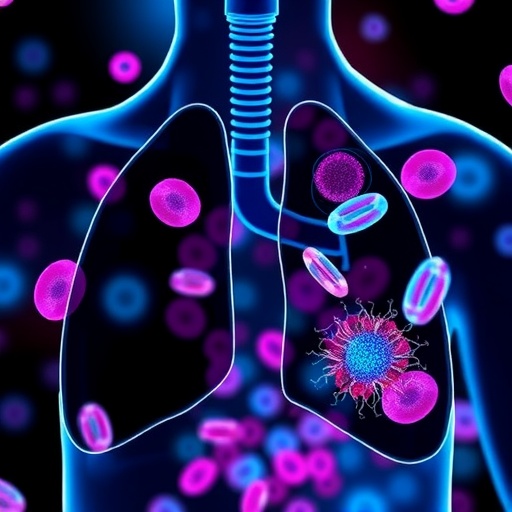Recent research has unveiled groundbreaking insights into the complex role of platelets in respiratory illnesses, distinguishing their transcriptomic profiles across various conditions. The study, led by Song, Jin, and Wang, highlights the intricate dynamics of platelet responses and their modulation through corticosteroids and immune antibody treatments. This further emphasizes the essential nature of personalized medicine as we continue to decipher the molecular intricacies governing respiratory diseases.
Platelets, often overlooked in discussions surrounding respiratory illnesses, are now emerging as critical players. Historically recognized primarily for their role in hemostasis, recent studies have expanded our understanding of platelets, revealing their significant involvement in immune responses and inflammatory processes. In assessing transcriptomic profiles, this study aimed to delineate the specific functional roles platelets may play across a spectrum of respiratory conditions, offering a new lens through which to observe their contributions.
The researchers carefully evaluated platelet RNA sequencing data from individuals suffering from various respiratory ailments, cementing the notion that platelet transcriptomic profiles differ significantly between diseases. These variations suggest that platelets might possess unique adaptive mechanisms that could influence disease severity and treatment responses. For instance, the findings indicate that platelets in asthma patients display markedly different expressions of immune modulation markers compared to those in chronic obstructive pulmonary disease (COPD) patients.
Moreover, the study posits that altered gene expression within platelets may not only reflect the pathophysiological state of the respiratory system but might also serve as a potential prognostic marker. The ability of platelets to adapt their transcriptional output in response to different inflammatory stimuli positions them as more than mere bystanders; they actively participate in modulating inflammatory responses during respiratory distress.
An integral aspect of this investigation was the examination of how corticosteroids, a common anti-inflammatory treatment, modulate platelet transcriptomic profiles. The researchers found that corticosteroid therapy can significantly alter the gene expression in platelets, potentially enhancing their immune-regulatory functions. This points to a dual role for corticosteroids—not only in reducing systemic inflammation but also in modifying platelet behavior, which may have implications for treatment efficacy across different respiratory conditions.
In addition to corticosteroids, the study explored the effects of immune antibody treatments on platelet behavior. These biologics, often employed in more severe cases of respiratory diseases, were found to interact with platelet signaling pathways in intriguing ways. The modulation of specific genes linked to inflammation and cell adhesion suggests that antibody therapies could reshape the platelet landscape in patients, further influencing disease trajectories and response to treatment.
The implications of these findings extend beyond immediate clinical applications. As we work towards personalized therapeutic strategies, understanding the distinct roles platelets play in different respiratory conditions can vastly improve targeting therapies more effectively. Real-time transcriptomic analysis of platelets could provide a non-invasive biomarker system, aiding in the monitoring of disease progression and treatment responses in patients.
Furthermore, the research raises important questions about the heterogeneity of platelet responses. As the study reveals, not all patients will respond uniformly to corticosteroids or antibody therapies, a reality that underscores the necessity for individualized treatment approaches. Future research could delve deeper into identifying the molecular factors that contribute to this variability, ultimately guiding clinicians in tailoring interventions based on a patient’s specific transcriptomic signature.
The study by Song et al. lays critical groundwork for the role of platelets in respiratory health, articulating the need for further exploration into their clinical significance. With respiratory illnesses remaining a leading cause of morbidity and mortality worldwide, understanding how cellular components like platelets interact within the immune system is paramount. This research opens avenues not only for enhanced therapeutic strategies but also for novel prognostic tools that incorporate platelet function as a key parameter.
In the larger context, this work fits into a growing body of research advocating for systems biology approaches in medicine. By acknowledging the multifaceted interactions between various blood cells, planners and researchers can better develop clinical pathways that reflect the complexity of the human immune response. Moving forward, integrating platelet transcriptomics into larger datasets may deepen our comprehension of respiratory diseases and inspire new methodologies to combat them.
Ultimately, as clinical practices evolve toward more holistic approaches, the revelations from this study underscore the importance of considering all elements of the immune response. The potential for platelets to act as both diagnostic and therapeutic targets illuminates an exciting frontier in respiratory medicine, demanding attention from both researchers and clinicians alike.
In summary, the distinctive platelet transcriptomic heterogeneity observed in this study provides critical insights that have far-reaching implications for how we approach the treatment of respiratory illnesses. The multifactorial nature of these conditions necessitates a reconsideration of treatment paradigms, driven by a robust understanding of not only the diseases themselves but also the cellular constituents of our immune systems. This pivotal research challenges us to reimagine the clinical landscape of respiratory health, calling for integrated strategies that transcend traditional boundaries.
In conclusion, the intricacies of platelet involvement in respiratory illnesses are just beginning to be unveiled, yet the implications of this research could be profound. By shedding light on how platelets adapt and respond at the transcriptomic level, we stand on the threshold of a new era in understanding respiratory pathophysiology that holds promise for improved patient management and outcomes.
Subject of Research: Platelet transcriptomic heterogeneity in respiratory illnesses
Article Title: Distinct platelet transcriptomic heterogeneity in respiratory illnesses and modulation by corticosteroids and immune antibody treatments
Article References: Song, W., Jin, K. & Wang, Q. Distinct platelet transcriptomic heterogeneity in respiratory illnesses and modulation by corticosteroids and immune antibody treatments. J Transl Med 23, 935 (2025). https://doi.org/10.1186/s12967-025-06845-0
Image Credits: AI Generated
DOI:
Keywords: Platelet transcriptomics, respiratory illnesses, corticosteroids, immune antibody treatments, personalized medicine, inflammation, asthma, COPD, biomarker, disease progression.




